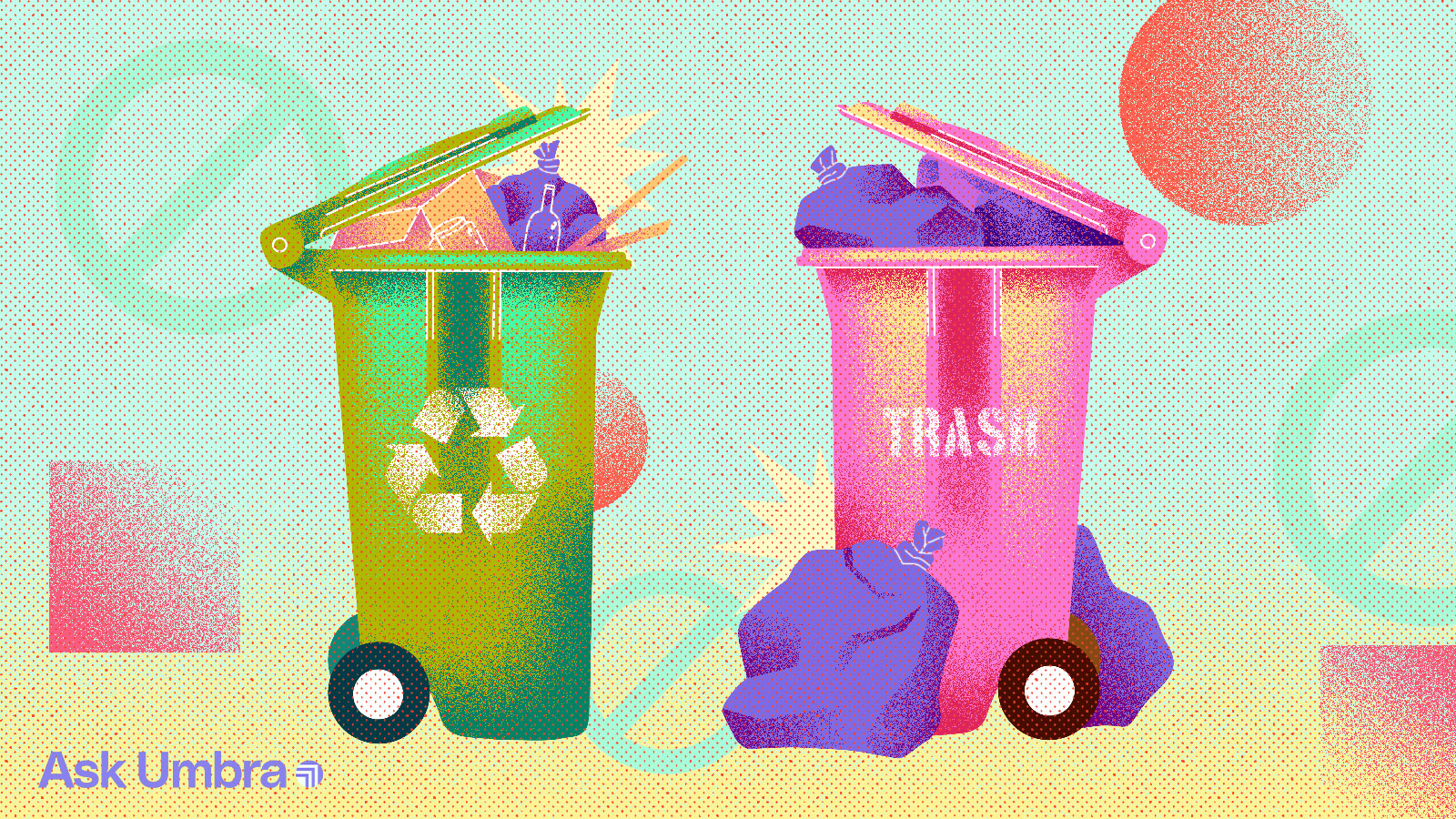Dear Umbra,
Our upstairs neighbors don’t recycle and our building’s trash pickup just switched to every two weeks. Now they’re taking over our garbage bin as well as theirs. How do we raise this issue with them?
— Barely Intact Neighborliness
Dear BIN,
The close proximity of city living tends to foster compromise with our neighbors. In apartments, our shared walls mean we can’t just holler at the top of our lungs at insane hours of the night. We try not to hurl ourselves at other passengers on the subway because they, too, are just trying to use a public resource to get where they have to go. There are occasional exceptions to these mostly unwritten rules, but by and large, people choose to follow them to live peaceably. It’s a testament to the cooperative potential of human nature!
But when it comes to the garbage facilities of a shared apartment complex, somehow the agreed-upon social contract goes entirely to shit. According to the Environmental Protection Agency, the average American produces 4.9 pounds of municipal solid waste per day. And with some cities reducing the frequency of trash pickup to save money, it’s a recipe for chaos. We lose all sense of fellowship in the mad dash to cram a broken computer monitor, a car trunk’s worth of styrofoam packaging, and 14 pizza boxes (rough week), into a 90-gallon garbage container before any of our neighbors arrive with their biweekly allotments of refuse.
I have a theory for why garbage is such a contentious community issue: There’s a lot of shame associated with trash. It takes up a lot of space, often smells bad, and reminds us of our personal wastefulness. We are very eager to get it out of both sight and mind! You can see this recurring theme in human trash disposal habits. Case studies show that people are more likely to separate their recyclables and compostables from landfill trash when the proper receptacles are both widely available and clearly marked. If you provide the opportunity to get rid of trash in an efficient and environmentally conscious manner, people will — by and large — take it.
However, if you limit the number of places people can get rid of their trash, they will not respond by producing less garbage. In fact, they will just throw it wherever they can — this phenomenon has been demonstrated in studies exploring why people litter. Basically, it’s because they don’t see anywhere else to deposit their trash. So, in the case of the chaotic shared garbage bins, the desire to get rid of waste in as swift a manner as possible supersedes the social principle of respecting shared resources. In this competitive scenario, the recycling bin ends up full of landfill-bound waste, the actual recycling ends up damp, stained, and unusable, and the neighborhood is overrun with raccoons. It’s a dark scene.
All this to say, it’s very unlikely that your neighbors’ behavior is malicious. It is, to some degree, a product of your city’s garbage infrastructure and your landlord’s decision not to increase the number of bins accordingly. But let’s take a moment to analyze this particular detritus doctrine.
You say that your neighbors don’t demonstrate any intent or desire to recycle. They are not alone! Only about half of Americans have access to curbside recycling, according to an analysis by the Recycling Partnership, and of those, about 72 percent take advantage of it. And there are any number of reasons why a person might not think it’s important to recycle, including a lot of propaganda from fossil fuel companies about the effectiveness of recycling has facilitated a massive industry for single-use plastic products and packaging. Maybe they believe that recycling is a farce and not worth their time. Or it could be not nearly as complex a reason as that! They could just not think about the planetary impact of waste!
But before you pen an open letter to the folks upstairs and affix it to your recycling bin, I suggest you take a moment to reflect on the importance of that aforementioned social contract. You don’t necessarily have the right to impart your values on your neighbor just because you think they should share them. That’s not an effective way to achieve your immediate goal here, which is to regain access to your recycling bin.
I think the best strategy here is honesty! I would approach your neighbor and explain that minimizing landfill waste is something that you personally try to practice, so you’d greatly appreciate anything they could do to keep recyclables out of your garbage bin. Rather than deliver a lecture, you’re appealing to the tacit responsibility that neighbors should respect each other’s space. You’re stating your request as an expression of your values and not a criticism of theirs.
I think most reasonable people would respond well to a respectful, earnest appeal such as this one. And — potentially — this kind of approach is a long-term climate resilience strategy. One study found that communities that maintained healthy, positive relationships with their neighbors fared better in the aftermath of natural disasters.
But I’ve argued before that ulterior motives shouldn’t drive the formation of any relationship — even if those motives serve the end goal of a livable planet and healthy environment. Try not to blow this conflict with your neighbors into something bigger than it is. Just because they don’t recycle doesn’t mean they are terrible, inconsiderate people; they’re probably just not thinking too much about how to minimize or dispose of trash because it’s not a value that’s very emphasized in American culture — or, more importantly, in American infrastructure! To that end, you could appeal to your landlord to install a few extra bins.You may end up being the hero of the whole building!
And, if all else fails and straightforward conflict resolution gives you hives and you’re not very squeamish about trash, you can always remove the recyclables from the bin yourself and dispose of them properly. I have actually done this. I will warn you that it does not make you look like a sane neighbor.
Not every personal conflict can be traced back to a systemic issue, but this is one that probably can be. No blame necessary.
Diplomatically,
Umbra



